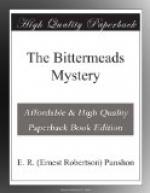Dunn remembered now, too, that it was Walter who had discovered that first murderous attempt which had first put them on their guard, but perhaps he had discovered it only because he knew of it, and when it failed, saw his safest plan was to be foremost in tracking it out.
And it was Walter who had last seen poor Charley Wright alone, and far from Bittermeads. But perhaps that was a lie to confuse the search for the missing man, and a reason why that search had failed so utterly up to the moment of Dunn’s own grim discovery in the attic.
With yet a fresh shock so that he reeled as he stood with the impact of the thought, Dunn realized that all this implied that every one of his precautions had been rendered futile that of all his elaborate plans not one would take effect since all had been entrusted to the care of the very man against whom they were aimed.
It was Walter for whom the net had been laid in Ottam’s Wood; and Walter to whom had been entrusted the task of drawing that net tight at the right moment.
It was Walter’s friends and agents who were to break into Wreste Abbey, and Walter to whom had been entrusted the task of defeating and capturing them. It was Walter from whom Ella stood in most danger if her action that morning had been observed, and it was Walter to whom he had given the task of protecting her.
At this thought, he turned and began to run as fast as he could in the direction of Bittermeads.
At all costs she must be saved, she who had exposed the whole awful plot. For a hundred yards or so he fled, swift as the wind, till on a sudden he stopped dead with the realization of the fact that every yard he took that way took him further and further from Ottam’s Wood.
For there was danger there, too—grim and imminent—and sentences in Ella’s hasty letter that bore now to his new knowledge a deep significance she had not dreamed of.
As when a flash of lightning lights all the landscape up and shows the traveller dreadful dangers that beset his path, so a wave of intuition told Dunn clearly the whole conspiracy; so that he saw it all, and saw how every detail was to be fitted in together. His father, General Dunsmore, was to be murdered first at the Brook Bourne Spring, to which he was being lured; and afterwards, when Dunn arrived, he was to be murdered, too. And on him, dead and unable to defend himself, the blame of his father’s death would be laid. It would not be difficult to manage. Walter would arrange it all as neatly as he had been accustomed to arrange the Dunsmore business affairs placed in his hands for settlement.
A forged letter or two, Dunn’s own revolver used to shoot the old man with and then placed in Dunn’s dead hand when his own turn had come, convincing detail like that would be easy to arrange. Why, the very fact of his disguise, the tangled beard that he had grown to hide his features with, would appear conclusive. Any coroner’s jury would return a verdict of wilful murder against his memory on that one fact alone.




